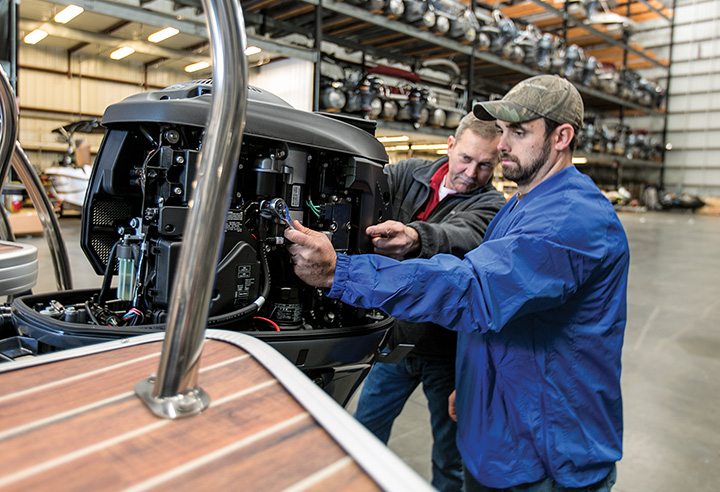The Workforce Crisis: Apprenticeships create funnel of incoming employees

Dealers and manufacturers have implemented apprenticeship programs to address their workforce shortages. These programs often take an employee who has a technical background – in marine trades or otherwise – and trains them on the job with a mentor.
At Russell Marine in Lake Martin, Ala., the apprentices start their six-month trial period at the dealership’s rigging facility, as rigging is easier to learn, requires little technical knowledge and exposes the apprentice to all types of boats. After four weeks, the apprentice moves to another area of the dealership, a process that is repeated until a performance review at 15 weeks, and another at 26 weeks. This exposes the apprentice to the ins and outs of the business.
While most businesses are in need of qualified techs right now, Dave Commander, president of Russell Marine, said this program helps properly vet employees to determine their strengths.
“If somebody’s been going through this program for 15 weeks or 20 weeks, [the dealers] know what [the apprentices] are capable of doing: they know where they can put them, where they might be of benefit to them, and it’s a good way to know your employees and where they can be of best fit,” he said.
After the full 26-week period, the apprentice is moved to an entry-level technician job where they follow a technician. The apprentice is given a hands-on experience as to how a technician interacts with computer systems, customers and management, as well as what tools to use and how to properly diagnose a problem.
“The key to making this successful was finding and hiring the right people, and that’s not easy to do either,” said Commander. “One area that we have found that has been successful in finding people is through our fellow employees. A lot of times the other technicians and other people in our [business] have friends that are maybe not happy with what they’re doing but have a good technical background.”
US Watercraft, a sail and powerboat manufacturer based in Warren, R.I., began its apprentice program by working with the Rhode Island Marine Trades Association on its pre-apprenticeship program. Graduates of RIMTA’s program have transitioned to apprenticeships at US Watercraft, which is a 5,000-hour program. US Watercraft also rotates its apprentices so that they are exposed to all aspects to boatbuilding, moving every six months.

“Many days they’re side by side, other days once [the apprentice] is into a project, their trainer will set them off and get them set up for the day and explain to them what’s expected, here’s what’s going on and let them go off on their own for a bit, and keep checking back with them,” said Guy Gauvin, operations manager at US Watercraft. “As the program goes on, there’s going to be classroom work involved as well: blueprint reading, general math, stuff like that where we send them off-site to learn.”
US Watercraft specifically designates employees to be mentors for apprentices, as Gauvin said some people have the skills to be a mentor and others do not. Currently, eight employees at US Watercraft are mentors.
“For a lot of the people that work here we selected to help train these guys, it’s spicing up their job a little bit. There’s a bit of a new spark in them as far as being able to teach some of these kids and bring them along,” said Gauvin. “They’re finding it to be kind of exciting and rejuvenated their career instead of just doing the same-old, same-old.”
Russell Marine bases its pay rate on experience; apprentices start at an apprentice pay rate and as they gain certain expertise, they can move up to Technician 1, Technician 2 and so forth, which comes with different levels of pay and skill requirements. This pay structure incentivizes the employees to keep learning.
“The apprentice is … developing a skill that will last him a lifetime,” Commander said. “As he develops a skill, he has a better chance to make more money, because the more skill the technician gets, the more money we pay him and the more money they make.”
Gauvin calls US Watercraft’s apprentice program “self-sustaining” for the long run, as the apprentices who stay on with the company long term can also train up new apprentices who come in years down the line.
“There’s nobody really out there that offers a program like this where they can receive the training. There’s not really, in our area, a vocational high school that is producing this type [of graduate]. They’ll teach your carpentry, mechanics, but not specific to the marine trades,” he said. “In our setting, we can teach you everything there is to know about it and specifically teach you our way of doing it so that you’re not coming into it with bad habits from someplace else that you worked.”




